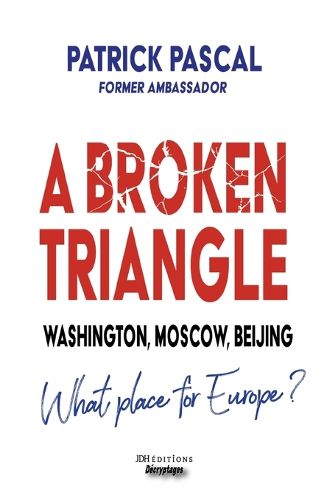Readings Newsletter
Become a Readings Member to make your shopping experience even easier.
Sign in or sign up for free!
You’re not far away from qualifying for FREE standard shipping within Australia
You’ve qualified for FREE standard shipping within Australia
The cart is loading…






This title is printed to order. This book may have been self-published. If so, we cannot guarantee the quality of the content. In the main most books will have gone through the editing process however some may not. We therefore suggest that you be aware of this before ordering this book. If in doubt check either the author or publisher’s details as we are unable to accept any returns unless they are faulty. Please contact us if you have any questions.
The arrival in power of D. Trump could well have heralded the era of a new Great Game of powers and the prospect of a cooperative three-way game with Moscow and Beijing. But the all-out tariff war, launched by the US President, appeared to be aimed primarily at China, ruining any hopes that might have been raised. With US influence over Europe seemingly shifting, if not waning, as Washington focuses on other interests, particularly in Asia, will Europe be able to develop a 'strategic autonomy' that goes beyond armaments to include high technology? Faced with a global identity crisis, of which populism in the United States and Europe is just one expression, how can shaken democracies renew themselves? 'A Broken Triangle' explores the shifting architecture of global power since the Cold War, from the U.S.-Soviet duopoly to a fragmented, multipolar world shaped by new powers like the BRICS and crises such as the war in Ukraine. It questions the decline of American influence, Europe's strategic ambitions, and the challenges faced by democracies under populist pressures. At the crossroads of politics, law, religion, and global governance, this book rethinks the future of international order in an age of uncertainty. There is the following pertinent observation: a triangle is not intended to be a square. Of course, but Europe can slip into one of the three points. The Triangle is not exclusive and consists of the Washington - Moscow - Beijing configuration. We can also imagine another Triangle made up of a point which is that of the greatest powers (NB: of which Europe may eventually be a part), a group bringing together emerging powers and countries which depend on them (NB: Europe may also be there). Finally, a minimum of multilateral organisation to deal with cross-cutting problems: this system - which, to put it simply, is the UN - is paralysed if not obsolete; it will have to be reformed or rebuilt. This is the second Triangle that is currently also fract
$9.00 standard shipping within Australia
FREE standard shipping within Australia for orders over $100.00
Express & International shipping calculated at checkout
Stock availability can be subject to change without notice. We recommend calling the shop or contacting our online team to check availability of low stock items. Please see our Shopping Online page for more details.
This title is printed to order. This book may have been self-published. If so, we cannot guarantee the quality of the content. In the main most books will have gone through the editing process however some may not. We therefore suggest that you be aware of this before ordering this book. If in doubt check either the author or publisher’s details as we are unable to accept any returns unless they are faulty. Please contact us if you have any questions.
The arrival in power of D. Trump could well have heralded the era of a new Great Game of powers and the prospect of a cooperative three-way game with Moscow and Beijing. But the all-out tariff war, launched by the US President, appeared to be aimed primarily at China, ruining any hopes that might have been raised. With US influence over Europe seemingly shifting, if not waning, as Washington focuses on other interests, particularly in Asia, will Europe be able to develop a 'strategic autonomy' that goes beyond armaments to include high technology? Faced with a global identity crisis, of which populism in the United States and Europe is just one expression, how can shaken democracies renew themselves? 'A Broken Triangle' explores the shifting architecture of global power since the Cold War, from the U.S.-Soviet duopoly to a fragmented, multipolar world shaped by new powers like the BRICS and crises such as the war in Ukraine. It questions the decline of American influence, Europe's strategic ambitions, and the challenges faced by democracies under populist pressures. At the crossroads of politics, law, religion, and global governance, this book rethinks the future of international order in an age of uncertainty. There is the following pertinent observation: a triangle is not intended to be a square. Of course, but Europe can slip into one of the three points. The Triangle is not exclusive and consists of the Washington - Moscow - Beijing configuration. We can also imagine another Triangle made up of a point which is that of the greatest powers (NB: of which Europe may eventually be a part), a group bringing together emerging powers and countries which depend on them (NB: Europe may also be there). Finally, a minimum of multilateral organisation to deal with cross-cutting problems: this system - which, to put it simply, is the UN - is paralysed if not obsolete; it will have to be reformed or rebuilt. This is the second Triangle that is currently also fract